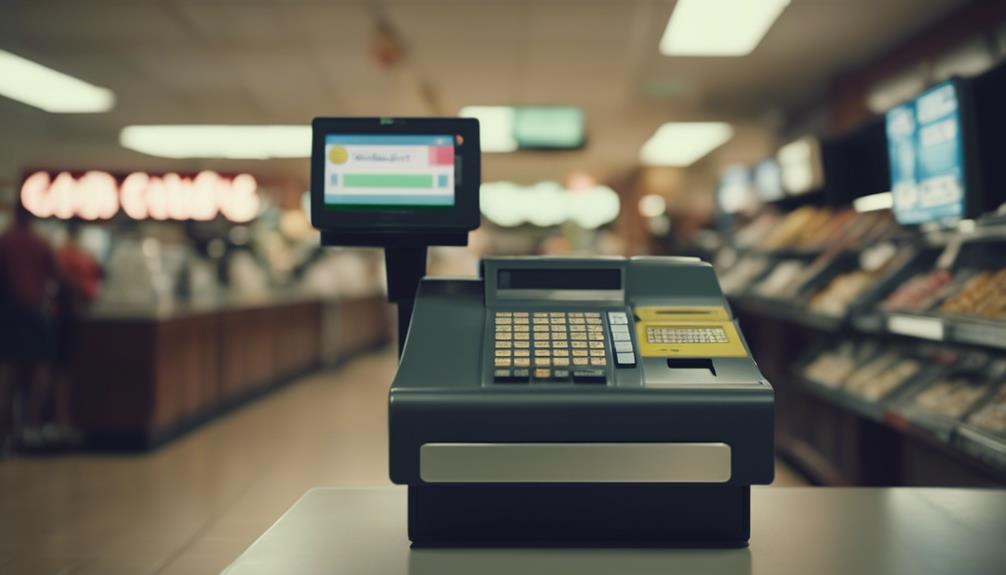Agent Programs & Merchant Services
Navigating the World of Merchant Cash Advances: Is It Right for Your Business?
Navigate the world of Merchant Cash Advances for potential business funding solutions, and discover if it aligns with your financial strategy.

Considering a merchant cash advance? This option leverages your future credit card sales for immediate cash. It suits businesses with fluctuating income. Carefully review terms, fees, and repayment terms. You receive a lump sum upfront, repaid through a percentage of your daily credit card sales. Factor rates influence total repayment costs. MCAs offer repayment flexibility aligned with your cash flow. They boast high approval rates and quick access to funds, but factor rates can lead to higher repayments. If you're curious to learn more about this financial tool, explore further into its intricacies, costs, and suitability for your business.
Key Takeaways
- MCAs suit businesses with fluctuating sales.
- Factor rates impact total repayment significantly.
- Understanding terms, fees, and repayment conditions is crucial.
- MCAs offer flexible repayment aligned with cash flow.
- Responsible use may not improve business credit.
Understanding Merchant Cash Advances

To grasp the concept of Merchant Cash Advances (MCAs), consider them as a strategic financial tool for leveraging future credit card sales into immediate cash injections. As a business owner, understanding Merchant Cash Advances is crucial for making informed financial decisions.
MCAs provide quick access to cash, based on your credit card transactions, allowing you to address immediate cash flow needs. When opting for an MCA, you basically sell a portion of your future credit card receivables at a discount in exchange for upfront cash. This can be beneficial for businesses with fluctuating sales that need immediate funds for various purposes such as inventory restocking or equipment upgrades.
It's important to carefully review the terms, fees, and repayment conditions associated with MCAs to make sure they align with your business goals. By thoroughly understanding how Merchant Cash Advances work and the impact they can have on your business, you can determine if this financial tool is the right choice for your current needs.
How MCAs Work

If you're considering utilizing Merchant Cash Advances for your business, understanding how MCAs work is essential for making informed financial decisions. Here's a breakdown to help you grasp the mechanics of MCAs:
- Lump Sum Provided: Initially, you receive a lump sum of cash to use for your business needs.
- Percentage of Future Credit Card Sales: Repayment is calculated as a percentage of your daily credit card transactions.
- Factor Rate: The factor rate, along with other factors, determines the total amount you'll repay.
- Flexible Repayment: MCAs offer flexibility in repayment, aligning with your business's cash flow.
Costs and Fees of MCAs

When considering Merchant Cash Advances (MCAs) for your business, it's important to understand the costs and fees associated with this financing option. Factor rates, which typically range from 1.10 to 1.5, greatly impact the total repayment amount you'll owe.
Keep an eye out for additional fees like origination fees that can further increase the overall cost of MCAs.
Understanding MCA Fees
Understanding the costs and fees associated with Merchant Cash Advances (MCAs) is essential for evaluating the financial impact on your business. Here are some key points to keep in mind:
- MCA fees are often expressed as factor rates between 1.10 to 1.5, influencing the total cost of borrowing greatly.
- Additional charges like origination fees can escalate the overall cost of MCAs, emphasizing the need to grasp the fee structure beforehand.
- Factor rates and fees play a critical role in determining the repayment amount and total cost of the cash advances.
- It's important to comprehend the fee breakdown in MCAs to assess the affordability and make an informed decision regarding this financing option.
Hidden Costs Revealed
Revealing the real costs of Merchant Cash Advances (MCAs) is important for businesses seeking financial support. When considering MCAs, factor rates play a key role in determining the overall cost of borrowing. These rates, typically ranging from 1.10 to 1.5, replace traditional interest rates and can have a big impact on the final amount owed.
Additionally, additional fees such as origination fees add to the total expense, making it essential to carefully assess the true cost. The combination of factor rates and various fees can lead to high Annual Percentage Rates (APRs) for businesses utilizing MCAs.
Hence, understanding the fees and costs associated with these cash advances is paramount before opting for this form of alternative financing.
Calculating MCA Expenses
When calculating MCA expenses, it's crucial to take into account the factor rate multiplied by the advance amount and any additional fees that may apply.
Understanding the breakdown of expenses and repayment terms will help you gauge the total cost of the merchant cash advance.
Careful evaluation of these factors guarantees you make an informed decision before proceeding with an MCA.
Expense Breakdown Overview
When calculating MCA expenses accurately, you must take into account the advance amount, factor rate, and any additional fees involved. To break down the costs effectively, consider the following:
- Advance Amount: The initial sum of money borrowed through the MCA.
- Factor Rate: A multiplier applied to the advance amount to determine the total repayment amount.
- Additional Fees: Such as origination fees that can add to the overall expense.
- Total Cost: The sum of the advance amount, fees, and the factor rate applied.
Understanding these components is important in grasping the full financial implications of a merchant cash advance. By calculating these elements thoughtfully, you can make informed decisions for your business.
Understanding Repayment Terms
To effectively manage your business finances, understanding the repayment terms of Merchant Cash Advances involves careful calculation of expenses. Repayment terms for cash advances typically include daily holdbacks ranging from 5% to 20% of credit card sales.
Calculating MCA expenses requires factoring in the advance amount, the factor rate (usually between 1.10 to 1.5), and any additional fees such as origination fees. The total payback amount is determined by multiplying the advance amount by the factor rate and adding any applicable fees.
This insight is vital for managing cash flow effectively and evaluating the total cost of borrowing. Remember that repayment terms vary based on the lender's assessment, the business's credit card sales, and the agreed-upon holdback rate, impacting your overall financial obligation.
Pros and Cons of MCAs

Have you considered the advantages and disadvantages of Merchant Cash Advances (MCAs) for your business? When evaluating MCAs as a form of business financing, it's important to weigh the pros and cons carefully. Here's a breakdown to help you navigate the decision:
- High Approval Rates: MCAs often boast high approval rates, providing a funding option for businesses with less than perfect credit.
- Flexible Repayment Schedules: With MCAs, you can benefit from flexible repayment schedules that align with your business's cash flow.
- Factor Rates: While MCAs offer quick access to cash, be mindful of the factor rates that may result in higher total repayment amounts.
- Building Business Credit: Unlike some traditional loans, responsible use of MCAs typically doesn't contribute to building business credit.
Considering these factors will help you make an informed choice regarding MCAs. Remember, understanding the total costs involved, such as factor rates and repayment terms, is important in determining if an MCA is the right fit for your business.
Comparing MCAs to Business Loans

Comparing Merchant Cash Advances (MCAs) to business loans reveals significant differences regarding APRs, approval times, credit requirements, and repayment structures. Business loans typically offer lower APRs ranging from 4% to 30%, making them a more cost-effective financing option compared to MCAs, which can have APRs starting at 20% and skyrocketing up to 350%.
When it comes to approval times, MCAs shine with quick processing within hours to days, while business loans may take weeks to secure. Credit scores and collateral also play an important role, as business loans often demand good credit and collateral, unlike MCAs that are more lenient towards businesses with lower credit scores and no collateral requirements.
Additionally, business loans commonly feature fixed monthly payments, whereas MCAs offer more flexibility with daily repayment structures based on a percentage of daily sales.
Eligibility for MCAs

Determining eligibility for Merchant Cash Advances (MCAs) revolves around factors such as monthly credit card transactions, business longevity, and credit scores. To determine if your small business meets the eligibility criteria for an MCA, consider the following:
- Monthly Credit Card Transactions: Lenders often look for a history of consistent credit card sales to assess your business's financial strength.
- Business Longevity: The longer your business has been operating, the more likely you're to be considered eligible for a merchant cash advance.
- Streamlined Application Process: Thanks to the streamlined online application process, applying for MCAs is convenient and straightforward.
- Fast Approval: Approval times for MCAs can be as quick as a few hours to a few days, offering a fast solution for businesses in need of immediate cash flow.
Applying for MCAs

To begin the application process for a Merchant Cash Advance (MCA), you can easily navigate through a streamlined online platform designed for quick approvals. This process typically involves filling out an application that may require information such as your business's monthly credit card transactions, longevity, and credit scores.
Small business owners seeking fast access to capital appreciate that funds from approved MCAs are often deposited within a day of approval. The application process for MCAs is efficient and straightforward, catering to businesses in need of immediate financial assistance.
When applying, be prepared to explore various repayment methods like automatic deductions, lockbox arrangements, or direct ACH withholding. These methods make sure that the repayment process aligns with your business's cash flow and financial preferences.
Exploring Alternative Funding Options

When considering funding options beyond Merchant Cash Advances, you can explore a variety of alternatives such as business lines of credit, small business loans, equipment financing, invoice financing, and crowdfunding.
Here are four alternative funding options to consider:
- Business Lines of Credit: Provide flexibility with a revolving credit line.
- Small Business Loans: Offer lump sum amounts with fixed or flexible repayment terms.
- Equipment Financing: Specifically tailored for purchasing equipment or machinery.
- Invoice Financing: Helps in managing cash flow by advancing funds based on outstanding invoices.
As you explore these alternatives, keep in mind that merchant cash advances typically come with higher rates and fees compared to traditional small business loans. Understanding the impact of high Annual Percentage Rates (APRs) and the daily sales percentage on your cash flow is important when selecting the right financing option for your business. Understanding the total cost of borrowing, including fees and repayment terms, will help you make an informed decision.
Frequently Asked Questions
Are Merchant Cash Advances a Good Idea?
Merchant cash advances can offer a quick capital influx for businesses with consistent credit card sales. They're a viable solution for those needing short-term financing and lacking strong credit scores. Accessible amounts range from $5,000 to $400,000, offering flexibility without requiring collateral.
Consider MCAs if you require immediate funds and have a steady credit card transaction history. Make sure to research and understand the terms and conditions before proceeding.
Are Merchant Cash Advances Predatory?
Merchant cash advances can have high APRs, ranging from 40% to 350%, which can surpass traditional loan costs. Although not legally considered predatory, their high rates and daily holdback structures can strain businesses.
Understanding terms, fees, and risks is important to prevent falling into debt cycles. It's essential to weigh the benefits against the potential financial burdens before opting for MCAs.
Are MCA Loans Secured?
MCA loans aren't secured by collateral like assets or property. Instead, they're backed by future credit card sales of the business. The lender receives a portion of daily credit card sales until the advance, fees, and factor rate are repaid. This structure makes MCA loans unsecured and based on future revenue.
Businesses with consistent credit card transactions can qualify for MCA loans without physical collateral.
Are MCA Personally Guaranteed?
When considering merchant cash advances, it's important to know if they require personal guarantees. MCAs typically hold the business accountable for repayment, not the individual owner.
Unlike traditional loans, personal guarantees are usually not needed for MCAs, as the lender's security lies in the business's future credit card sales.
Understanding the terms of the MCA agreement is vital to clarify any personal guarantee obligations, ensuring you make informed decisions for your business.
Conclusion
To sum up, while merchant cash advances can provide quick funding for businesses, it's important to carefully consider the costs and fees associated with this type of financing. One common objection is the higher cost compared to traditional business loans.
However, if used strategically and with a clear understanding of the terms, MCAs can be a valuable tool for businesses in need of immediate capital. Remember to weigh all options and choose the financing option that best suits your business needs.
Agent Programs & Merchant Services
Avoiding Common Mistakes in Merchant Services Implementation
Yearning for success in merchant services? Learn how to sidestep pitfalls and ensure smooth operations for your business.

When implementing merchant services, avoid common missteps for business success. Research payment processors thoroughly to make informed decisions on fees and services. Prioritize security by complying with PCI DSS and using secure gateways. Scrutinize contract terms and fees to prevent unexpected costs. Choose providers with robust customer support for issue resolution. Don't overlook mobile payments – crucial in today's digital era. Integration streamlines operations and boosts efficiency. Effective chargeback management safeguards revenue and reputation. Following these steps guarantees a smooth process and financial stability in your business endeavors.
Key Takeaways
- Thoroughly research and compare payment processors for informed decisions.
- Prioritize implementing security measures like PCI DSS compliance and two-factor authentication.
- Scrutinize contract terms and fees to avoid unexpected charges.
- Choose a provider with reliable customer support for issue resolution.
- Optimize for mobile payments to attract customers and drive conversions.
Lack of Research

Avoid the costly mistake of rushing into selecting a payment processor without conducting thorough research. Choosing a payment processor without adequate investigation may lead to unsuitable solutions for your business. Different providers offer varying transaction fees, monthly charges, and contract terms that can impact the overall cost and efficiency of your merchant account setup.
By not delving into the details, you risk facing unexpected costs and subpar services that could hinder your business operations. To guarantee a successful merchant account setup, it's imperative to compare and understand the offerings of various payment processors. This understanding will enable you to make an informed decision based on your specific business needs and budget constraints.
Taking the time to research and compare payment processors will ultimately help you avoid the pitfalls of inadequate services and costly surprises down the line.
Ignoring Security Measures

Neglecting security measures in payment processing leaves businesses vulnerable to fraud and risks compromising customer trust. To guarantee a secure payment processing system, Merchants must prioritize implementing robust security measures.
Here are three essential steps to enhance security:
- Comply with PCI DSS: Prioritizing Payment Card Industry Data Security Standard (PCI DSS) compliance is vital for safeguarding sensitive customer information.
- Implement Secure Payment Gateways: Utilize secure payment gateways and additional security layers like two-factor authentication to strengthen the security of transactions.
- Invest in Fraud Detection Tools: Investing in SSL certificates and fraud detection tools can help monitor and prevent suspicious activities, reducing the risk of financial losses and data breaches.
Overlooking Contract Terms and Fees

Be sure to carefully scrutinize contract terms and fees to avoid unforeseen charges and expenses in your merchant services implementation. When setting up payment processing for your business, paying attention to transaction fees, chargeback fees, and any hidden charges is vital.
Failing to review and understand these contract terms can lead to unexpected financial burdens. Take the time to negotiate with the payment processor to secure more favorable conditions that align with your financial planning and budgeting.
Thoroughly reviewing the contract terms will help you steer clear of unfavorable surprises that could impact your bottom line. Understanding the implications of these fees and terms is essential for making informed decisions about your merchant services.
Inadequate Customer Support

Insufficient customer support in merchant services can greatly hinder your business operations and cause potential revenue loss. To guarantee a smooth experience, consider the following:
- Choose a Reliable Provider: Opt for a merchant services provider that offers dedicated account managers and 24/7 assistance. This guarantees that you have a direct point of contact for any issues that may arise.
- Effective Communication with Payment Processor: Clear channels of communication with your payment processor are essential for efficient problem-solving. This helps in resolving any payment-related issues promptly, preventing any disruptions in your revenue flow.
- Prioritize Issue Resolution: Inadequate customer support can lead to challenges in payment processing, impacting your overall business operations. By giving priority to customer support in merchant services, you enhance customer satisfaction and build trust in your business.
Neglecting Mobile Payments

Failing to prioritize mobile payment optimization in your business strategy can result in missed opportunities and potential customer dissatisfaction. With over 50% of e-commerce transactions now originating from mobile devices, neglecting mobile payments could lead to a significant loss of potential customers. Research shows that 57% of users are unlikely to recommend a business with a poorly designed mobile site, highlighting the impact of mobile commerce on consumer perception.
The projected $3.56 trillion mobile commerce industry by 2021 underscores the growing importance of mobile payment solutions for businesses. Essential mobile-friendly payment options are vital in attracting customers, as 88% of consumers searching for local businesses on mobile devices tend to engage with those businesses within 24 hours. Additionally, having a mobile-optimized site can triple the likelihood of mobile users making a purchase, emphasizing the need for seamless mobile payment experiences to drive conversions.
Prioritizing mobile payments is no longer just an option but a necessity in today's digital landscape.
Non-Compliance With Regulations

Non-adherence with regulations, such as PCI DSS, poses significant risks to your business. Failing to meet industry standards can lead to severe consequences, including data breaches and legal penalties.
It's vital to prioritize regulatory compliance to protect customer data, uphold trust, and avoid hindering your business's growth potential.
Regulatory Compliance Importance
Ensuring regulatory compliance in merchant services implementation is crucial for safeguarding your business from potential fines and legal repercussions. Compliance is essential for protecting sensitive customer data and upholding data security standards.
Failure to comply can result in business disruptions, financial losses, and the potential closure of merchant accounts. By adhering to regulatory requirements, you demonstrate a commitment to ethical business practices and industry standards, enhancing trust with your customers.
It's imperative to prioritize regulatory compliance to avoid damaging your reputation and facing legal consequences. Stay proactive in meeting the necessary standards to mitigate risks and maintain a secure environment for your business operations.
Legal Consequences of Non-Compliance
To protect your business from potential fines and legal repercussions, understanding the legal consequences of not complying with regulations is essential in the merchant services implementation process.
Non-compliance with regulations, such as the Payment Card Industry Data Security Standard (PCI DSS), can result in severe consequences for your business. Violating these standards may lead to data breaches, compromising sensitive customer information and exposing your business to financial losses and damage.
Failure to adhere to industry regulations can tarnish your business's reputation and credibility. The legal ramifications of non-compliance include lawsuits, loss of business licenses, and regulatory sanctions.
Ensuring compliance with regulations is vital to safeguard your business, maintain security, and uphold trust with your customers and financial partners.
Inadequate Integration With Business Systems

Insufficient integration with business systems can greatly impede your payment processing efficiency and accuracy. To avoid these pitfalls, consider the following:
- Streamlined Operations: Seamless integration with accounting, inventory, and CRM systems is essential for ensuring smooth payment processing.
- Manual Data Entry: Failure to integrate payment processing with existing systems may lead to manual data entry and reconciliation challenges, impacting overall efficiency.
- Real-Time Tracking: Integrated systems allow for real-time tracking of transactions, inventory levels, and customer data. This data accessibility empowers better decision-making processes.
Choosing payment solutions with easy integration APIs can significantly enhance operational efficiency and accuracy. By ensuring that your payment processing system is well-integrated with your business systems, you pave the way for a more streamlined and error-free operation.
Underestimating Chargeback Management

Underestimating the importance of effective chargeback management can lead to significant financial losses and reputation damage for your business. Each chargeback can cost your business an average of $50-$75 in fees and lost revenue, impacting your bottom line.
To tackle this issue, understanding reason codes, responding promptly to notifications, and providing compelling evidence for representment are key steps. Monitoring chargeback trends and patterns can help you identify areas for improvement in your products, services, or processes, enabling you to proactively address issues.
Implementing chargeback prevention strategies, such as utilizing fraud detection tools and educating customers, can greatly reduce the occurrence of chargebacks. Effective chargeback management not only protects your revenue but also plays an important role in maintaining a positive reputation in the merchant services industry.
Frequently Asked Questions
What Is a Merchant Error?
A merchant error is a mistake that occurs during the implementation of merchant services. These errors can involve incorrect pricing, business information, or banking details, leading to consequences like unexpected fees and account activation delays.
Research and attention to detail are essential in preventing these errors during implementation. Promptly addressing and correcting merchant errors is vital for maintaining smooth payment processing operations.
What Are the Disadvantages of a High Risk Merchant Account?
When you have a high risk merchant account, you may encounter drawbacks like higher processing fees to mitigate potential risks. Your business could face stricter underwriting criteria and increased scrutiny during the application process. Rolling reserves are common, where a portion of each transaction is held for chargebacks.
Access to traditional banking services might be limited, and you could experience elevated chargeback rates. Shorter contract terms and higher account termination risks are also associated with high risk merchant accounts.
What Is a Merchant Complaint?
When a business raises concerns about their merchant services, it's known as a merchant complaint. These can range from billing issues to technical glitches in payment processing. Resolving these complaints promptly is crucial for a healthy business relationship with your service provider.
Neglecting these issues can impact your operations and customer satisfaction. Tracking and analyzing these complaints can help you pinpoint areas for improvement in your merchant services implementation.
Conclusion
In summary, when implementing a new merchant services system, it's important to:
- Conduct thorough research
- Prioritize security
- Understand contract terms
- Offer robust customer support
- Embrace mobile payments
- Follow regulations
- Integrate with business systems
- Manage chargebacks effectively
By avoiding common mistakes in these areas, you can guarantee a smooth and successful changeover for your business. Remember, attention to detail now can save you headaches later.
Agent Programs & Merchant Services
Potential Pitfalls in Adopting New Payment Technologies
Yielding to compatibility issues and resistance can hinder adoption of new payment technologies, but strategies exist to overcome these challenges.

When adopting new payment technologies, watch out for compatibility issues with existing systems, risking integration challenges. Employee and customer resistance due to fear or security concerns can slow progress. Operational disruptions from incompatible systems can lead to downtime; proper training is essential to prevent errors and vulnerabilities. Security measures against data breaches and cyberattacks are paramount. Thorough planning, testing, and education help iron out integration bumps. Familiarity with payment tech and efficient planning are key. Understanding potential pitfalls is essential in managing the adoption process. More insights await on optimizing payment tech changes.
Key Takeaways
- Resistance to change from employees and customers can hinder adoption rates.
- Inadequate training may lead to errors and vulnerabilities in the system.
- Operational disruptions can occur due to incompatible systems and lack of training.
- Data security risks, including breaches and cyberattacks, are significant concerns.
- Addressing compatibility issues and providing education are crucial for successful integration.
Compatibility Issues With Existing Systems

Why do compatibility issues with existing systems pose significant challenges when adopting new payment technologies?
When integrating new payment systems, ensuring compatibility with existing infrastructure is vital.
Incompatibility can lead to integration challenges, causing operational disruptions such as data loss, system crashes, or performance issues.
The lack of interoperability between old and new systems can impede the seamless flow of transactions, affecting the efficiency of payment processing.
Upgrading or replacing legacy systems to align with modern payment technologies can be both costly and time-consuming.
Failure to address these compatibility issues not only hinders the adoption of new payment technologies but also compromises their overall effectiveness.
Organizations must carefully assess the compatibility of their existing systems with the new payment technologies to avoid potential pitfalls and guarantee a smooth integration without any disruptions in payment processing.
Resistance From Employees and Customers

When implementing new payment technologies, you may encounter resistance from employees who fear change, lack proper training, or are comfortable with current systems.
Customers, on the other hand, might hesitate to adopt new payment methods due to unfamiliarity, security concerns, or simply preferring traditional options.
Overcoming these challenges through education, training, and building trust is crucial to guarantee successful adoption of new payment technologies.
Employee Training Challenges
How can businesses effectively address resistance from employees and customers when implementing new payment technologies?
Employee training challenges often arise due to the unfamiliarity with new systems, leading to slower adoption rates. To overcome this resistance, implementing thorough training programs is essential. By educating employees on the functionalities of the new payment technologies, businesses can mitigate delays in implementation.
Additionally, customers may face obstacles in using unfamiliar payment methods, affecting their satisfaction levels. Providing clear instructions and support through training programs can help customers feel more confident in utilizing the new technologies.
Ultimately, overcoming resistance through proper training is key to successfully integrating new payment technologies into your business operations.
Customer Trust Concerns
Addressing concerns about security and privacy is essential in gaining the trust of both employees and customers when introducing new payment technologies. To overcome resistance and build confidence in the payment experience, consider the following:
- Implement robust security measures to protect sensitive information.
- Provide clear and detailed information about the security protocols in place.
- Offer training sessions to educate employees on the new payment technologies and security features.
- Address any past data breaches or fraudulent activities related to similar technologies to alleviate customer concerns.
Disruptions in Operations and Data Loss

When adopting new payment technologies, be aware of potential disruptions in operations and data loss risks.
Incompatible systems can lead to downtime, while inadequate training may result in errors and security vulnerabilities.
Addressing these challenges is vital to maintaining business continuity and safeguarding sensitive information.
Operational Challenges
Operational challenges arising from the adoption of new payment technologies can result in disruptions to business operations and potential data loss if not properly managed. To navigate these challenges effectively, consider the following:
- Integration Efficiency: Ensure seamless integration of new systems to prevent operational disruptions and delays in payment processing.
- Employee Training: Provide adequate training and support to employees for using new payment technologies to enhance operational efficiency.
- Data Backup: Implement robust backup and recovery mechanisms to mitigate the risk of data loss during the shift.
- Customer Impact: Addressing operational challenges promptly is vital to maintaining customer satisfaction and trust in the payment process.
Security Risks
To safeguard your business operations and data integrity when adopting new payment technologies, understanding and mitigating security risks is essential. Data breaches and phishing attacks are significant threats that can lead to disruptions in operations and potential data loss. Cyberattacks targeting vulnerabilities in new payment systems pose a risk of exposing sensitive customer information to unauthorized access, potentially resulting in financial losses.
Implementing robust security measures, such as proper encryption and authentication methods, is vital in mitigating these security risks. By staying vigilant and proactive in addressing potential threats, you can better protect your business and customer data when embracing new payment technologies. Prioritizing security measures will help safeguard your operations and maintain trust with your customers.
Inefficiencies in Integration Process

Businesses often encounter challenges with integration inefficiencies when adopting new payment technologies, leading to delays and increased implementation costs. To navigate through these issues effectively, consider the following:
- Thorough Planning: Invest time in mapping out the integration process to identify potential roadblocks and guarantee a smoother shift.
- Compatibility Checks: Prioritize compatibility assessments with existing systems to address any integration conflicts early on.
- Testing Protocols: Implement rigorous testing procedures to detect and rectify any integration issues before full deployment.
- Training Programs: Provide extensive training to staff to optimize the adoption and usage of new payment technologies seamlessly.
Slow Adoption Rate of New Methods

Despite the advancements in payment technologies, the slow adoption rate of new methods persists due to various factors inhibiting widespread acceptance.
Lack of awareness among consumers plays a significant role in this delay. For instance, only 17% of small businesses in the US currently accept digital wallets, highlighting a significant gap in knowledge and implementation.
Additionally, resistance to change and a reliance on traditional payment methods further hinder the uptake of new technologies. Many individuals and businesses are comfortable with their current payment processes and are hesitant to switch to unfamiliar methods.
Furthermore, concerns surrounding security and data privacy act as significant barriers to adoption. The fear of potential breaches or unauthorized access to personal information deters many from embracing new payment technologies.
Addressing these factors and increasing education about the benefits and safety measures of new payment methods are vital steps in accelerating their acceptance and integration into mainstream usage.
Lack of Familiarity With Payment Technologies

Traversing through the ever-evolving landscape of payment technologies can be challenging for individuals and organizations unfamiliar with the latest advancements. To navigate this terrain effectively, consider the following:
- Digital Payments: Understanding the ins and outs of digital payment methods is vital for seamless transactions and financial security.
- Customer Service: Lack of familiarity with new payment technologies can result in delays and errors in customer transactions, impacting satisfaction levels.
- Mobile Wallet: Exploring the functionalities of mobile wallets is essential for businesses looking to cater to the growing trend of cashless payments.
- Training and Education: Investing in training programs to educate staff on using new payment technologies can boost efficiency and overall adoption rates.
Importance of Planning and Testing Implementation

Properly planning and testing the implementation of new payment technologies is essential for ensuring a successful adoption and identifying potential issues early on. Planning plays a significant role in evaluating the compatibility of the new technology with existing systems. It helps in streamlining the integration process, ensuring a smooth incorporation.
Testing the implementation phase is equally vital as it allows for the identification of bugs, errors, and integration challenges that may arise during the adoption process. By addressing these issues early on through testing, operational disruptions can be prevented, leading to enhanced customer satisfaction.
Effective planning and thorough testing serve to mitigate risks associated with the adoption of new payment technologies, ultimately contributing to a successful implementation. Therefore, investing time and resources in detailed planning and testing procedures are paramount for a seamless integration and optimal utilization of new payment technologies.
Frequently Asked Questions
What Are the Problems in Implementing Electronic Payment System?
When implementing an electronic payment system, challenges arise. These include system integration issues, staff training needs, business operation disruptions, security risks, and high costs.
Integration with existing infrastructure can be complex, requiring time and resources. Training staff to use new systems is essential but can be costly. Changeover periods may disrupt normal operations.
Security concerns, like data breaches and fraud, must be addressed. Initial and ongoing costs for electronic payment systems can be significant.
What Are the Challenges Facing Mobile Payment Systems?
When considering challenges facing mobile payment systems, you may encounter:
- Security issues like data breaches and unauthorized access,
- Regulatory hurdles concerning compliance and privacy laws,
- Technological obstacles related to integration and scalability.
Additionally, customer adoption challenges include trust in digital payments and user experience concerns. Operational issues such as payment processing delays and lack of customer support can also impact mobile payment systems.
What Are the Disadvantages of Digital Payment Options?
When considering the disadvantages of digital payment options, it's important to acknowledge potential security risks, usability challenges, limited merchant acceptance, regulatory complexities, and confusion stemming from a lack of standardization.
These factors can hinder your experience with digital payments, making it essential to weigh the convenience against these drawbacks and take necessary precautions to safeguard your financial transactions.
Stay informed and vigilant to navigate the digital payment landscape effectively.
What Factors Do You Consider When Choosing a Payment Method?
When choosing a payment method, consider security, convenience, merchant acceptance, costs, and customer trust.
Confirm encryption and authentication for security.
Opt for user-friendly options accepted widely.
Check for fees to manage expenses efficiently.
Gauge customer trust and familiarity for adoption rates.
Evaluating these factors helps in selecting a suitable payment method that meets your needs and guarantees a smooth transaction experience.
Conclusion
To sum up, when embracing new payment technologies, it's crucial to be mindful of potential pitfalls that may arise. By addressing compatibility issues, overcoming resistance, and planning for disruptions, businesses can navigate the integration process more effectively.
Remember, thorough planning and testing are key to successful implementation. Stay informed, stay prepared, and stay ahead of the curve to guarantee a smooth adaptation to new payment methods.
Agent Programs & Merchant Services
Risk Assessment for Merchant Services: A Comprehensive Guide
Yearning to safeguard your merchant services from threats? Uncover essential risk assessment strategies and tips to fortify your business.

In the world of merchant services, a comprehensive risk assessment is essential for protecting your business from potential risks like fraud, cybersecurity threats, and regulatory issues. By identifying vulnerabilities and threats, you can prevent financial losses and prioritize risk management efforts effectively. Strategies such as implementing strong authentication processes and utilizing advanced fraud detection tools can help mitigate risks. Consider compliance with regulations like PCI DSS and GDPR to guarantee data protection and customer trust. Operational risk mitigation techniques and employee training are also key elements in safeguarding your business. Explore more insights to enhance your risk assessment practices.
Key Takeaways
- Identify vulnerabilities and threats in merchant services.
- Prioritize risk management efforts based on assessment findings.
- Allocate resources to address immediate risks effectively.
- Minimize financial losses through thorough risk assessment.
- Enhance operational efficiency and stakeholder trust.
Types of Merchant Services Risks

When evaluating risks associated with merchant services, it's essential to understand the various types of risks that can impact payment processing systems. Fraud poses a significant threat to merchant services, with unauthorized transactions and fraudulent activities jeopardizing the security of payment processes.
Cybersecurity risks, including data breaches, malware attacks, and ransomware, can compromise sensitive information and disrupt the smooth functioning of payment systems. Compliance and regulatory risks are vital considerations for merchant service providers, as non-compliance with industry regulations may result in fines and legal consequences.
Chargeback risks stemming from customer disputes can have financial implications for merchants utilizing payment services. Market and reputational risks are also critical, as unresolved issues in merchant services can damage brand reputation and erode customer trust.
Unauthorized access to payment systems further heightens the risks associated with merchant services, emphasizing the importance of robust security measures to safeguard against potential threats.
Importance of Risk Assessment

To understand the importance of risk assessment in merchant services, one must grasp how identifying vulnerabilities and threats can lead to financial losses. By conducting thorough risk assessments, businesses can prioritize their risk management efforts effectively. This enables the allocation of resources to areas that require immediate attention, helping in making informed decisions to safeguard against potential risks. Effective risk assessment not only minimizes financial losses but also enhances operational efficiency and builds stakeholder trust. Moreover, it ensures regulatory compliance, protecting assets and fostering sustainable business operations.
In the domain of risk assessment, strategies such as risk avoidance, mitigation, transfer, acceptance, and control play important roles. These strategies allow businesses to proactively manage risks in merchant services, reducing the likelihood of financial losses and enhancing overall resilience. By embracing risk assessment methodologies, businesses can fortify their operations, comply with regulations, and maintain stakeholder trust, thereby paving the way for sustainable growth and success.
Fraud Risk Management Strategies

How can businesses effectively combat fraudulent activities in merchant services through robust authentication processes and advanced fraud detection tools? To manage fraud risk effectively, it's important to implement thorough risk management strategies.
Begin by training your employees on recognizing and addressing potential fraud indicators. This proactive approach can greatly enhance your fraud prevention capabilities.
Additionally, leverage machine learning algorithms and AI technologies to stay ahead of evolving fraud tactics. Regularly review and update your fraud prevention strategies to adapt to changing fraud patterns and safeguard financial transactions.
Collaborating with industry partners and sharing fraud intelligence can also play an essential role in collectively improving fraud risk management across payment processors. Conduct regular audits and ensure compliance with industry standards to maintain a secure payment environment.
Compliance and Regulatory Considerations

When it comes to merchant services, understanding and complying with legal requirements is essential.
Monitoring your compliance with industry regulations like PCI DSS, AML, and GDPR is vital for data security and operational integrity.
Legal Requirements Overview
Ensuring adherence to legal requirements, such as PCI DSS, is paramount for safeguarding payment card data in the merchant services industry. Regulatory considerations like GDPR and AML regulations are vital to prevent financial crimes. Non-compliance can result in hefty fines, legal actions, and reputational damage. Robust compliance measures guarantee data protection, customer trust, and business sustainability. Regular audits are necessary to uphold compliance with evolving legal frameworks. Below is a table summarizing key aspects of legal requirements in the merchant services industry:
| Aspect | Importance |
|---|---|
| PCI DSS Compliance | High |
| GDPR Adherence | Essential |
| AML Regulations | Critical |
| Fines for Non-Compliance | Severe |
| Regular Audits | Necessary |
Compliance Monitoring Strategies
Effective compliance monitoring strategies play a crucial role in ensuring adherence to industry regulations and standards in the merchant services sector. By implementing robust compliance monitoring tools and software, you can automate compliance checks, flag any deviations from regulatory requirements, and continuously monitor transactions, customer data, and internal processes.
These strategies help mitigate legal risks, prevent financial penalties, and maintain a positive reputation within the industry. To stay compliant, consider training your staff, conducting regular risk assessments, and staying updated on changing regulatory requirements.
Thorough compliance monitoring is essential to safeguard against security breaches, data misuse, and Card industry regulations. Prioritizing compliance management won't only protect your business but also build trust with your customers.
Operational Risk Mitigation Techniques

To effectively mitigate operational risks in your merchant services, consider implementing redundancy in your processes. Conduct stress tests and train your employees on proper protocols. Utilize automated monitoring systems to detect anomalies and establish clear communication channels for prompt issue resolution.
Risk Identification Strategies
When identifying operational risks in merchant services, you must assess internal processes, systems, and human factors that could result in financial losses. To effectively identify and mitigate operational risks, consider implementing the following strategies:
- Conduct regular audits to evaluate the effectiveness of internal controls.
- Enhance staff training to guarantee awareness of potential vulnerabilities.
- Monitor key performance indicators and establish early warning systems for timely risk detection.
Incident Response Planning
Considering the operational risks previously identified, your next priority lies in developing a robust Incident Response Planning strategy for mitigating potential threats and ensuring timely and effective security incident management in your merchant services operations.
Incident response planning entails creating a structured approach to address security incidents promptly, minimizing financial losses, and preventing reputational damage. By identifying potential threats, establishing response procedures, and conducting regular drills, you enhance your security posture and ensure business continuity.
Through this proactive approach, you can effectively handle security incidents, maintain customer trust, and safeguard your operations from disruptions. Implementing a well-thought-out incident response plan is vital for the resilience and success of your merchant services business.
Technological Tools for Risk Prevention

Utilizing advanced technological tools such as tokenization, encryption, machine learning, and blockchain greatly enhances merchant services' resilience against fraud and cyber threats.
Tokenization replaces sensitive cardholder data with unique tokens, safeguarding customer information. Encryption employs robust algorithms to protect data during storage and transmission, reducing the risk of unauthorized access.
Machine Learning and AI technologies play an important role in fraud prevention by analyzing transaction patterns and identifying anomalies effectively. Blockchain technology offers secure transaction processing through decentralized and immutable ledgers, greatly minimizing the risk of fraud and tampering.
Human Factor in Risk Management

To strengthen your merchant services against security breaches, understanding the impact of human factors on risk management is essential. Human errors play a significant role in security breaches within merchant services. By training your employees on security protocols and best practices, you can mitigate risks associated with these human errors. Social engineering attacks target human vulnerabilities, underscoring the importance of employee awareness training to combat such threats effectively. Insider threats also pose a notable risk in merchant services, highlighting the need for robust access controls and monitoring mechanisms to detect and prevent potential breaches. Implementing multi-factor authentication can provide an added layer of security against human-related risks. By incorporating these security protocols and best practices, you can strengthen your defenses and safeguard your merchant services against a wide range of potential threats.
| Keywords | Description | Importance |
|---|---|---|
| Employee Training | Vital for mitigating human errors and security risks | High |
| Social Engineering | Targets human vulnerabilities, emphasizing awareness | Medium |
| Insider Threats | Requires robust access controls and monitoring | High |
| Multi-Factor Auth | Adds extra security layer against human-related risks | Medium |
| Security Protocols | Establishes guidelines for secure practices | High |
Frequently Asked Questions
What Are the 7 Steps of the Risk Management Process?
The seven steps of the risk management process are:
- Risk identification involves spotting potential risks that could impact merchant services.
- Risk assessment evaluates the likelihood and impact of identified risks.
- Risk analysis explores root causes and consequences.
- Risk evaluation determines risk significance and prioritizes based on potential impact.
- Risk treatment involves developing and implementing strategies to mitigate risks.
- Risk monitoring involves tracking identified risks and evaluating the effectiveness of risk treatments.
- Risk communication ensures that relevant stakeholders are informed about risks and risk management strategies.
Remember these steps for effective risk management in your merchant services operations.
What Risks Will Merchants Face?
You'll face numerous risks as a merchant, including:
- fraudulent transactions
- payment card fraud
- chargebacks
- cybersecurity threats like data breaches and malware attacks
- non-compliance with industry regulations
- currency fluctuations
- market/reputational risks
These factors can impact your financial outcomes, disrupt payment systems, and harm your brand reputation.
It's essential to assess these risks proactively to safeguard your business and maintain trust with your customers.
What Are the 5 Principles of Risk Management?
In risk management, the 5 principles are vital:
- Risk identification spots potential risks.
- Analysis gauges their likelihood and impact.
- Evaluation determines the importance of risks.
- Treatment involves taking actions to address or mitigate risks effectively.
- Monitoring guarantees that risk management measures stay relevant and effective.
These principles form the backbone of a solid risk management strategy.
What Is a Merchant Risk?
Merchant risk refers to potential financial losses and reputational damage tied to providing merchant services. It encompasses threats like fraudulent transactions, cybersecurity breaches, and non-compliance with regulations.
Evaluating merchant risk is crucial for pinpointing vulnerabilities in payment systems. Understanding these risks allows businesses to proactively protect financial transactions.
Effective risk management strategies can mitigate these risks and shield businesses from potential harm.
Conclusion
As you have learned, conducting a thorough risk assessment for your merchant services is vital in safeguarding your business from potential threats. By implementing fraud risk management strategies, staying compliant with regulations, and utilizing technological tools, you can mitigate operational risks effectively.
Remember, addressing the human factor in risk management is also essential for a holistic approach. Stay vigilant, stay informed, and prioritize risk prevention to guarantee the success and security of your merchant services.
-

 Credit Card Processing & ISOs3 months ago
Credit Card Processing & ISOs3 months agoThe Role of a Registered ISO at a Bank
-

 Starting & Managing Payment Services2 months ago
Starting & Managing Payment Services2 months agoNavigating Chargeback Disputes: Key Considerations for Merchants
-

 Starting & Managing Payment Services3 months ago
Starting & Managing Payment Services3 months agoIntegrating and Managing Multiple Payment Solutions Effectively
-

 Starting & Managing Payment Services3 months ago
Starting & Managing Payment Services3 months agoAccounts Payable Vs. Accounts Receivable Unveiled
-

 Starting & Managing Payment Services3 months ago
Starting & Managing Payment Services3 months agoHow to Manage Compliance Risks in Payment Services
-

 Starting & Managing Payment Services3 months ago
Starting & Managing Payment Services3 months agoPartnerships and Collaborations: Expanding Your Payment Service Reach
-

 Agent Programs & Merchant Services3 months ago
Agent Programs & Merchant Services3 months agoPotential Pitfalls in Adopting New Payment Technologies
-

 Credit Card Processing & ISOs3 months ago
Credit Card Processing & ISOs3 months agoUnderstanding the Dynamics of Chargebacks and How to Contest Them












